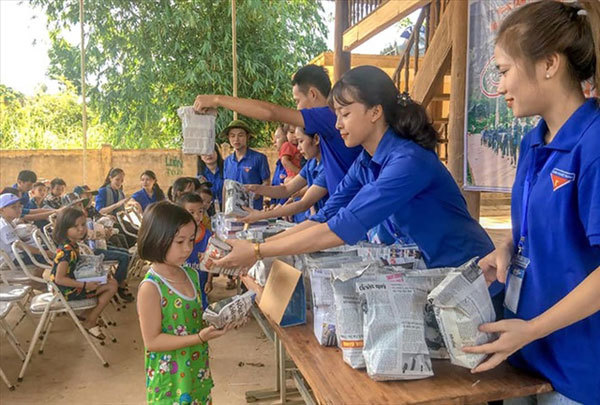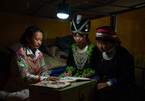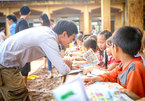 |
| Student volunteers deliver presents to children in Vang Mon Village in the free-of-charge stall. — Photo tienphong.vn |
Hung is head of a student volunteer team including 36 members from Vinh University in the central province of Nghe An.
The O Du are one of the five smallest ethnic minority groups in Vietnam. Most of the about 400 O Du live in Vang Mon Village, Tuong Dương District in Nghe An Province. O Du people have their own language, culture and customs, but these are in danger of being lost.
Together
During the campaign, the student volunteers lived, ate and worked with the locals.
They helped the locals make roads, spread knowledge on laws, organised musical performances and repaired houses for those who made great contributions to the nation.
Hung told Tiền phong (Vanguard) newspaper that the team had many female members, and nearly half of them had joined such a campaign for the first time.
Hung said the locals' tough lives made a great impression on the young team members, who were all familiar with urban life.
Only when Hung went there, did he understand how hard life can be in such remote areas. The roads are full of obstacles, they lack water and electricity, and have weak mobile phone signals.
Truong Ngoc Phuong Thao, one of the team members, said the village did not have a market, so the students must borrow motorbikes to go to neighbouring villages for some food.
Nguyen Hang, another member, was worried about the hot and stuffy summer weather in Vang Mon Village.
“Every difficulty of living in remote and mountainous areas is challenging, but we didn't lose our spirit and willingness. On the contrary, the difficulties urged us to understand, share and have more motivation to help the O Du people have a better life,” she said.
Earlier start
They organised various activities in Vang Mon Village, such as the inauguration of a traditional cultural house, children’s summer games, law education, cultural exchange, and making 200 metres of a concrete road.
“On the days of making the road, we really felt the ‘taste’ of volunteer work,” said Hung.
The volunteers' day started at 4am when they cooked, had breakfast and get ready to begin work at 6am.
“No competition was launched, but the members were eager to make efforts from transferring construction materials to mixing concrete and levelling the ground,” said Hung.
Overcoming sun and rain, the student volunteers gave a new coat to the 200m muddy road.
The team also set up a free-of-charge stall for children in the village offering notebooks, school supplies, antibacterial soap and confectionery.
Xeo Thi Phon, an official of the Tuong Duong District Youth Union, told Tiền Phong that the student volunteer team was one of four teams from different universities in the province that went to the district to help out.
“With the spirit of vanguard for the community, the students have organised many activities and joined meaningful work to set up a new rural lifestyle,” she said.
During their work, the students always received love and recognition from local leaders, authorities and residents.
“Through volunteer activities, the students have the opportunity to experience and train themselves, and be able to understand and share the difficulties of the people and then they will try to study and work to make a practical contribution to society,” said Phon.
Volunteering to support ethnic minorities is a special feature in the Green Summer Campaign this year.
Besides the O Du ethnic minorities, student volunteers have also helped different groups of people such as Cong in northern mountainous Dien Bien Province; Mang, Si La, Lu and La Hu people in northern mountainous Lai Chau Province; Pu Peo and Co Lao in northern mountainous Ha Giang Province; the Chứt in central Quang Binh Province; and Brâu and Rơ Măm in Central Highlands Kon Tum Province.
Green Summer Campaign is an annual summer volunteer programme launched by the Central Committee of the Ho Chi Minh Communist Youth Union and the Vietnam Students’ Association.
The annual programme began in 1993 as an anti-illiteracy campaign named Chiến dịch ánh sáng văn hóa hè (Summer Anti-Illiteracy Campaign) and was renamed Mùa hè xanh (Green Summer Campaign) in 1997.
The campaign’s objective is to get students involved in community and charity activities. They do social welfare, children activities and rural development programmes such as teaching English, internet and computer skills, improving the environment, building houses for poor and disadvantaged residents and much more.
Every year, thousands of students join the campaign across the country. VNS

Lights given to encourage ethnic minority students go to school
UNESCO in Vietnam and Signify Foundation in Vietnam have provided solar lighting systems and portable solar lamps to more than 5,000 students at 16 secondary schools in remote, disadvantaged areas in three provinces

Bibliophile dedicates to bring books to ethnic minority children
For Nguyen Tu Anh, books are everything. In his hundred-square-metre rented house in HCM City, books can be found literally everywhere.
 Pham Van Hung has finished a 15-day campaign of supporting ethnic Ơ Đu minorities with his friends from university.
Pham Van Hung has finished a 15-day campaign of supporting ethnic Ơ Đu minorities with his friends from university.